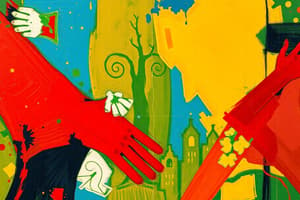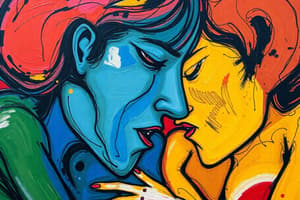Podcast
Questions and Answers
What do proponents of bio-psychological theory suggest is the solution to high crime rates?
What do proponents of bio-psychological theory suggest is the solution to high crime rates?
- Legalizing drugs
- Improving social factors (correct)
- Harsh punishment
- Increasing police presence
Freudian theory emphasizes the importance of early childhood development.
Freudian theory emphasizes the importance of early childhood development.
True (A)
What are the three elements of personality according to Freudian theory?
What are the three elements of personality according to Freudian theory?
id, superego, ego
Freud stated that people's personality is largely determined by the age of ______.
Freud stated that people's personality is largely determined by the age of ______.
What does the 'id' represent in Freudian theory?
What does the 'id' represent in Freudian theory?
Freudian theory provides extensive explanations of violent behavior.
Freudian theory provides extensive explanations of violent behavior.
Match the following Freudian concepts with their correct descriptions:
Match the following Freudian concepts with their correct descriptions:
According to the psychodynamic theory, human nature is inherently ______.
According to the psychodynamic theory, human nature is inherently ______.
What is a primary reason deteriorated areas attract more crime?
What is a primary reason deteriorated areas attract more crime?
According to the theory of anomie, stable economic conditions lead to higher rates of crime.
According to the theory of anomie, stable economic conditions lead to higher rates of crime.
Name two social issues strongly correlated with disorganization in communities.
Name two social issues strongly correlated with disorganization in communities.
The migration of middle-class individuals out of cities is referred to as _______.
The migration of middle-class individuals out of cities is referred to as _______.
Which economic condition saw the highest rates of suicides according to Durkheim?
Which economic condition saw the highest rates of suicides according to Durkheim?
Match the following concepts with their descriptions:
Match the following concepts with their descriptions:
Fear in deteriorated areas often develops even when crime rates have not significantly increased.
Fear in deteriorated areas often develops even when crime rates have not significantly increased.
What happens to communities when middle-class residents leave? Provide one consequence.
What happens to communities when middle-class residents leave? Provide one consequence.
What term is used to describe the part of the mind that distinguishes between right and wrong?
What term is used to describe the part of the mind that distinguishes between right and wrong?
Freud believed that completing each stage of development is unnecessary for healthy adult functioning.
Freud believed that completing each stage of development is unnecessary for healthy adult functioning.
What is the average IQ observed in criminal populations according to the DOJ summary?
What is the average IQ observed in criminal populations according to the DOJ summary?
Freud introduced the concept of development occurring in __________.
Freud introduced the concept of development occurring in __________.
Which of the following is NOT associated with the reasons behind crime according to the findings discussed?
Which of the following is NOT associated with the reasons behind crime according to the findings discussed?
Match the following psychological concepts to their descriptions:
Match the following psychological concepts to their descriptions:
High intelligence can provide protection against criminal behavior in at-risk individuals.
High intelligence can provide protection against criminal behavior in at-risk individuals.
What criticism has been raised regarding attributing crime to low IQ?
What criticism has been raised regarding attributing crime to low IQ?
What does the Relative Deprivation theory primarily emphasize?
What does the Relative Deprivation theory primarily emphasize?
Females tend to commit crimes at a higher rate than males.
Females tend to commit crimes at a higher rate than males.
What historical example illustrates the concept of relative deprivation in the military?
What historical example illustrates the concept of relative deprivation in the military?
According to relative deprivation theory, crime can be a result of the 'have-nots' seeing what the '________' have.
According to relative deprivation theory, crime can be a result of the 'have-nots' seeing what the '________' have.
Match the following terms with their definitions:
Match the following terms with their definitions:
Which group in the military felt more overlooked according to relative deprivation theory?
Which group in the military felt more overlooked according to relative deprivation theory?
Relative deprivation refers to individuals feeling poor regardless of their social environment.
Relative deprivation refers to individuals feeling poor regardless of their social environment.
What effect does societal organization have on behavior according to subcultural theories?
What effect does societal organization have on behavior according to subcultural theories?
What is a primary characteristic valued in the lower class according to the subculture of violence?
What is a primary characteristic valued in the lower class according to the subculture of violence?
According to Wolfgang and Ferracuti's theory, lower class people feel they have complete control over their lives.
According to Wolfgang and Ferracuti's theory, lower class people feel they have complete control over their lives.
What are common activities that lower class individuals engage in to spice up their lives?
What are common activities that lower class individuals engage in to spice up their lives?
The theory that suggests members of a subculture hold values different from the central society is called the __________.
The theory that suggests members of a subculture hold values different from the central society is called the __________.
Match the term with its description:
Match the term with its description:
Which region of the United States has historically been associated with higher rates of violent crime?
Which region of the United States has historically been associated with higher rates of violent crime?
The Southern subculture of violence promotes peaceful resolutions to conflicts.
The Southern subculture of violence promotes peaceful resolutions to conflicts.
What did Loftin's study in the early 1970s reveal about homicide rates?
What did Loftin's study in the early 1970s reveal about homicide rates?
According to Symbolic Interactionist theory, what is primarily flexible and can change over time?
According to Symbolic Interactionist theory, what is primarily flexible and can change over time?
Labeling theory emphasizes the initial causes of delinquency rather than societal reactions.
Labeling theory emphasizes the initial causes of delinquency rather than societal reactions.
What do labeling theorists believe about the nature of criminals?
What do labeling theorists believe about the nature of criminals?
According to Symbolic Interactionism, children's views of themselves change as they interact with _______.
According to Symbolic Interactionism, children's views of themselves change as they interact with _______.
Match the following criminological theories to their key concepts:
Match the following criminological theories to their key concepts:
What is a consequence of being labeled as a delinquent according to the Labeling Theory?
What is a consequence of being labeled as a delinquent according to the Labeling Theory?
Delinquency is considered an inherent property of the individual according to the theories discussed.
Delinquency is considered an inherent property of the individual according to the theories discussed.
What prompts serious delinquents to become defined by their actions according to the Labeling Theory?
What prompts serious delinquents to become defined by their actions according to the Labeling Theory?
Flashcards
Conscience
Conscience
The internalized set of moral rules and values that guide our behavior, often shaped by external influences.
Ego
Ego
The part of the mind that is responsible for our conscious thoughts, feelings, and actions.
Id
Id
The part of the mind that contains our basic instincts and desires, like the drive for pleasure.
Superego
Superego
Signup and view all the flashcards
Psychosexual Stages of Development
Psychosexual Stages of Development
Signup and view all the flashcards
Successful Completion of Stages
Successful Completion of Stages
Signup and view all the flashcards
Intelligence
Intelligence
Signup and view all the flashcards
Intelligence and Crime
Intelligence and Crime
Signup and view all the flashcards
Social Psychological Theories of Crime
Social Psychological Theories of Crime
Signup and view all the flashcards
Inherent Antisocial Nature
Inherent Antisocial Nature
Signup and view all the flashcards
Early Childhood Development
Early Childhood Development
Signup and view all the flashcards
Subconscious Mind
Subconscious Mind
Signup and view all the flashcards
Personality Development by Age 5
Personality Development by Age 5
Signup and view all the flashcards
Anomie
Anomie
Signup and view all the flashcards
Strain Theories
Strain Theories
Signup and view all the flashcards
Deteriorated Areas
Deteriorated Areas
Signup and view all the flashcards
White Flight
White Flight
Signup and view all the flashcards
Deteriorated Areas Attract Crime
Deteriorated Areas Attract Crime
Signup and view all the flashcards
Resource Drain
Resource Drain
Signup and view all the flashcards
Economic Change & Anomie
Economic Change & Anomie
Signup and view all the flashcards
Crime in Disorganized Areas
Crime in Disorganized Areas
Signup and view all the flashcards
Strain Theory: A Shortcoming
Strain Theory: A Shortcoming
Signup and view all the flashcards
Relative Deprivation Theory
Relative Deprivation Theory
Signup and view all the flashcards
Army Air Corps (Air Force) Promotion
Army Air Corps (Air Force) Promotion
Signup and view all the flashcards
Relative Deprivation Theory and Crime
Relative Deprivation Theory and Crime
Signup and view all the flashcards
Subcultural Theories
Subcultural Theories
Signup and view all the flashcards
Subcultures and Criminal Behavior
Subcultures and Criminal Behavior
Signup and view all the flashcards
Subculture of Violence
Subculture of Violence
Signup and view all the flashcards
Learning of Violence
Learning of Violence
Signup and view all the flashcards
Fatalism
Fatalism
Signup and view all the flashcards
Autonomy and Sensitivity
Autonomy and Sensitivity
Signup and view all the flashcards
Regional Subcultures and Violence
Regional Subcultures and Violence
Signup and view all the flashcards
Loftin's Study
Loftin's Study
Signup and view all the flashcards
Subculture of Violence Theory: Critiques
Subculture of Violence Theory: Critiques
Signup and view all the flashcards
Violence in the Name of Honor
Violence in the Name of Honor
Signup and view all the flashcards
Social Disorganization Theory
Social Disorganization Theory
Signup and view all the flashcards
Symbolic Interactionism
Symbolic Interactionism
Signup and view all the flashcards
Labeling Theory
Labeling Theory
Signup and view all the flashcards
Differential Association Theory
Differential Association Theory
Signup and view all the flashcards
Social Constructionism
Social Constructionism
Signup and view all the flashcards
Social Reaction Theory
Social Reaction Theory
Signup and view all the flashcards
Social Learning Theory
Social Learning Theory
Signup and view all the flashcards
Social Control Theory
Social Control Theory
Signup and view all the flashcards
Study Notes
Theories of Violence
- There are few theories of violence, distinguished from theories of crime or delinquency, which sometimes include violence.
- Early theories of crime and violence were largely biological, considering factors like genetics, hormones, and brain disorders.
- Biological influences on aggression overlap significantly with violence.
- Birth complications (e.g., anoxia) and malnutrition during pregnancy can potentially lead to increased violence.
- Hormones, particularly testosterone, are linked to aggression, but measuring testosterone levels during criminal acts poses difficulties.
- Neurotransmitters, like dopamine and serotonin, are linked to impulsive control, a significant factor in various crimes, including violence.
- Psycho-physiological causes connect body and mind, often tied to arousal levels, with extreme behaviors used to regulate these levels.
Psychodynamic Theory
- Focuses on childhood development as a basis for future behavior.
- Freud developed theories relating to a conflict between the 'id', 'ego', and 'superego'. These constructs represent different aspects of a person's personality, including desires, awareness, internal controls, and conscience respectively
- The id is based on primal impulses.
- The ego operates on a more conscious level to direct and manage these impulses.
- The superego is the conscience.
- All three of these interact throughout one's life, and development is related to the stages through which people go
- Freud's theories are important to criminal justice theories, but do not comprehensively explain violence.
- Freud developed his theories for a specific target audience and with specific goals for his practice.
Intelligence
- Studies have linked lower intelligence to crime, but not as a direct cause.
- IQ scores of criminal populations are typically lower than the general population mean.
Frustration-Aggression Theory
- Frustrating circumstances trigger aggressive responses.
- Frustrations involve a blocked anticipated outcome or reward.
- Aggression resulting from frustration might not be immediate, but could be delayed, deflected, or displaced onto different targets.
Social Disorganization Theory
- Crime rates are focused in particular areas of a city, typically connected with low-income areas and ethnic diversity.
- The causes are connected to the breakdown or lack of community norms/values.
- This theory emerged from the University of Chicago.
- The central zones in a city, especially those close to major industrial zones, experience the highest crime rates, not other parts of the city.
- Delinquency is perpetuated in these areas and not in others
Strain Theory
- This theory suggests the experience of strain contributes to crime. The strain can result
- from blocked opportunities to achieve desired goals
- Anomie is the breakdown or absence of norms or societal values in a social system.
- Changing economic circumstances can lead to strain
- Different types of strain or circumstances, like lack of financial stability, lead to various kinds of crime.
- There are four basic economic circumstances affecting this theory:
- Stable good economic conditions
- Stable bad economic conditions
- Change from good conditions to bad conditions
- Change from bad conditions to good conditions
Relative Deprivation Theory
- Crime is exacerbated when people's circumstances seem worse compared to others around them.
- This social comparison leads to discontent and aggression.
- This theory explains disparities in crime statistics that do not reflect the level of poverty and crime based on statistics.
Subcultural Theories
- Delinquent subcultures arise among certain groups, typically from lower socioeconomic backgrounds.
- These groups develop their own norms and values that differ from the mainstream and often support criminal behavior and violence.
- Examples of behaviors associated with subcultures that lead to crime include getting into trouble, engaging in violence, and excitement.
- These subcultures rationalize behaviors to explain their choices
- Some theorists have argued that subcultures exist, but no evidence of them.
Control Theory
- This theory does not focus on why people offend but rather why people do not offend
- It suggests strong bonds to society (attachment, commitment, involvement, and belief) prevent crime.
- Strong bonds stem from healthy interpersonal relationships, and societal support for norms/values, in order to guide individuals towards moral values and behaviors.
Social Interaction Theory
- This theory is based on how people's perceptions of others is based on social norms/interactions.
- This theory highlights the interactions between victims and offenders in crimes.
Labeling Theory
- The theory questions how reactions to crime affect criminal behaviors.
- When individuals are labeled as criminals, they internalize the label and potentially engage in more delinquent behavior.
- Societal reactions and expectations affect criminal behavior
Differential Association Theory
- This theory assumes that criminal behavior is learned.
- Through interaction and communication with others, individuals learn criminal behavior, including techniques, rationale, and attitudes.
- These learned factors can lead to individuals acting criminally, which may involve others or not
Lifestyle Theory
- People's lifestyle choices, such as time spent in risky places and relationships, increase the risk of victimization or offending.
- Certain lifestyle characteristics increase the risk of crime.
Victim precipitation Theory
- This theory explores how victims' actions can contribute to criminal incidents.
- Victims may proactively provoke or enable criminal behavior.
Control and Deterrence Theory of Crime
- These theories address how prevention programs and control mechanisms discourage criminal activity.
- Deterrence theories suggest that criminals are deterred/restrained from acting due to the potential punishments for this action.
Studying That Suits You
Use AI to generate personalized quizzes and flashcards to suit your learning preferences.
Related Documents
Description
Explore the various theories of violence, including biological factors and psychodynamic perspectives. This quiz delves into how genetics, hormones, and childhood development influence aggressive behavior. Test your understanding of the complex interplay between biology and psychology in the realm of violence.




